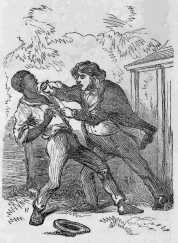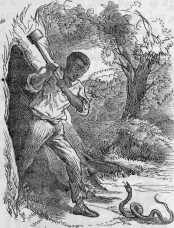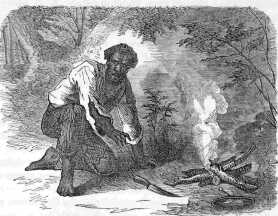The Underground Railroad
Arrival from North Carolina, 1857
HARRY GRIMES, GEORGE UPSHER, AND EDWARD LEWIS.
FEET SLIT FOR RUNNING AWAY, FLOGGED, STABBED, STAYED IN THE HOLLOW OF A BIG POPLAR TREE, VISITED BY A SNAKE, ABODE IN A CAVE.The coming of the passengers here noticed was announced in the subjoined letter from Thomas Garrett:
WILMINGTON, 11th Mo. 25th, 1857.
RESPECTED FRIEND, WILLIAM STILL:—I write to inform thee, that Captain Fountain has arrived this evening from the South with three men, one of which is nearly naked, and very lousy. He has been in the swamps of Carolina for eighteen months past. One of the others has been some time out. I would send them on to-night, but will have to provide two of them with some clothes before they can be sent by rail road. I have forgotten the number of thy house. As most likely all are more or less lousy, having been compelled to sleep together, I thought best to write thee so that thee may get a suitable place to take them to, and meet them at Broad and Prime streets on the arrival of the cars, about 11 o’clock to-morrow evening. I have engaged one of our men to take them to his house, and go to Philadelphia with them to-morrow evening. Johnson who will accompany them is a man in whom we can confide. Please send me the number of thy house when thee writes.
THOMAS GARRETT.
This epistle from the old friend of the fugitive, Thomas Garrett, excited unusual interest. Preparation was immediately made to give the fugitives a kind reception, and at the same time to destroy their plagues, root and branch, without mercy.
They arrived according to appointment. The cleansing process was carried into effect most thoroughly, and no vermin were left to tell the tale of suffering they had caused. Straightway the passengers were made comfortable in every way, and the spirit of freedom seemed to be burning like “fire shut up in the bones.” The appearance alone of these men indicated their manhood, and wonderful natural ability. The examining Committee were very desirous of hearing their story without a moment’s delay.
As Harry, from having suffered most, was the hero of this party, and withal was an intelligent man, he was first called upon to make his statement as to how times had been with him in the prison house, from his youth up. He was about forty-six years of age, according to his reckoning, full six feet high, and in muscular appearance was very rugged, and in his countenance were evident marks of firmness. He said that he was born a slave in North Carolina, and had been sold three times. He was first sold when a child three years of age, the second time when he was thirteen years old, and the third and last time he was sold to Jesse Moore, from whom he fled. Prior to his coming into the hands of Moore he had not experienced any very hard usage, at least nothing more severe than fell to the common lot of slave-boys, therefore the period of his early youth was deemed of too little interest to record in detail. In fact time only could be afforded for noticing very briefly some of the more remarkable events of his bondage. The examining Committee confined their interrogations to his last taskmaster.
“How did Moore come by you?” was one of the inquiries. “He bought me,” said Harry, “of a man by the name of Taylor, nine or ten years ago; he was as bad as he could be, couldn’t be any worse to be alive. He was about fifty years of age, when I left him, a right red-looking man, big bellied old fellow, weighs about two hundred and forty pounds. He drinks hard, he is just like a rattlesnake, just as cross and crabbed when he speaks, seems like he could go through you. He flogged Richmond for not ploughing the corn good, that was what he pretended to whip him for. Richmond ran away, was away four months, as nigh as I can guess, then they cotched him, then struck him a hundred lashes, and then they split both feet to the bone, and split both his insteps, and then master took his knife and stuck it into him in many places; after he done him that way, he put him into the barn to shucking corn. For a long time he was not able to work; when he did partly recover, he was set to work again.”

We ceased to record anything further concerning Richmond, although not a fourth part of what Harry narrated was put upon paper. The account was too sickening and the desire to hear Harry’s account of himself too great to admit of further delay; so Harry confined himself to the sufferings and adventures which had marked his own life. Briefly he gave the following facts: “I have been treated bad. One day we were grubbing and master said we didn’t do work enough. ‘How came there was no more work done that day?’ said master to me. I told him I did work. In a more stormy manner he ‘peated the question. I then spoke up and said: ‘Massa, I don’t know what to say.’ At once massa plunged his knife into my neck causing me to stagger. Massa was drunk. He then drove me down to the black folk’s houses (cabins of the slaves). He then got his gun, called the overseer, and told him to get some ropes. While he was gone I said, ‘Massa, now you are going to tie me up and cut me all to pieces for nothing. I would just as leave you would take your gun and shoot me down as to tie me up and cut me all to pieces for nothing.’ In a great rage he said ‘go.’ I jumped, and he put up his gun and snapped both barrels at me. He then set his dogs on me, but as I had been in the habit of making much of them, feeding them, &c. they would not follow me, and I kept on straight to the woods. My master and the overseer cotched the horses and tried to run me down, but as the dogs would not follow me they couldn’t make nothing of it. It was the last of August a year ago. The devil was into him, and he flogged and beat four of the slaves, one man and three of the women, and said if he could only get hold of me he wouldn’t strike me, ‘nary-a-lick,’ but would tie me to a tree and empty both barrels into me.

In the woods I lived on nothing, you may say, and something too. I had bread, and roasting ears, and ‘taters. I stayed in the hollow of a big poplar tree for seven months; the other part of the time I stayed in a cave. I suffered mighty bad with the cold and for something to eat. Once I got me some charcoal and made me a fire in my tree to warm me, and it liked to killed me, so I had to take the fire out. One time a snake come to the tree, poked its head in the hollow and was coming in, and I took my axe and chopped him in two. It was a poplar leaf moccasin, the poisonest kind of a snake we have. While in the woods all my thoughts was how to get away to a free country.”
Subsequently, in going back over his past history, he referred to the fact, that on an occasion long before the cave and tree existence, already noticed, when suffering under this brutal master, he sought protection in the woods and abode twenty-seven months in a cave, before he surrendered himself, or was captured. His offence, in this instance, was simply because he desired to see his wife, and “stole” away from his master’s plantation and went a distance of five miles, to where she lived, to see her. For this grave crime his master threatened to give him a hundred lashes, and to shoot him; in order to avoid this punishment, he escaped to the woods, etc. The lapse of a dozen years and recent struggles for an existence, made him think lightly of his former troubles and he would, doubtless, have failed to recall his earlier conflicts but for the desire manifested by the Committee to get all the information out of him they could.

He was next asked, “Had you a wife and family?” “Yes, sir,”. he answered, “I had a wife and eight children, belonged to the widow Slade.” Harry gave the names of his wife and children as follows: Wife, Susan, and children, Oliver, Sabey, Washington, Daniel, Jonas, Harriet, Moses and Rosetta, the last named he had never seen. “Between my mistress and my master there was not much difference.”
Of his comrades time admitted of writing out only very brief sketches, as follows:
EDWARD LEWIS.
$100 REWARD.—Ran away from the subscriber, on the 7th of November, negro slave, EDGAR. He is 36 years old, 6 feet high, of dark brown complexion, very high forehead, is a little bald, and is inclined to stoop in the shoulders. Edgar says he was raised in Norfolk county, has worked about Norfolk several years. I bought him at the Auction house of Messrs. Pulham & Davis, the 20th of July, 1856. The bill of sale was signed by W.Y. Milmer for Jas. A. Bilisoly, administrator of G.W. Chambers, dec’d. He told one of my negroes he was going to Norfolk to sell some plunder he had there, then go to Richmond, steal his wife, get on board a boat about Norfolk, and go to a free State. He can read and write well, and I have no doubt he has provided himself with papers of some kind. He may have purchased the papers of some free negro. I will give the above reward of One Hundred Dollars to any person who will arrest and confine him, so I can get him.
C.H. GAY.
My Post office is Laurel, N.C. no. 21.
The above advertisement, which was cut from a Southern paper, brought light in regard to one of the passengers at least. It was not often that a slave was so fortunate as to get such a long sketch of himself in a newspaper. The description is so highly complimentary, that we simply endorse it as it stands. The sketch as taken for the record book is here transcribed as follows:
“Edward reported himself from Franklin county, N.C., where, according to statement, a common farmer by the name of Carter Gay owned him, under whose oppression his life was rendered most unhappy, who stinted him daily for food and barely allowed him clothing enough to cover his nakedness, who neither showed justice nor mercy to any under his control, the ‘weaker vessels’ not excepted; therefore Edward was convinced that it was in vain to hope for comfort under such a master. Moreover, his appetite for liquor, combined with a high temper, rendered him a being hard to please, but easy to excite to a terrible degree. Scarcely had Edward lived two years with this man (Gay) when he felt that he had lived with him long enough. Two years previous to his coming into the hands of Gay, he and his wife were both sold; the wife one day and he the next. She brought eleven hundred and twenty-five dollars, and he eight hundred and thirty-five dollars; thus they were sold and resold as a matter of speculation, and husband and wife were parted.”
After the fugitives had been well cared for by the Committee, they were forwarded on North; but for some reason they were led to stop short of Canada, readily finding employment and going to work to take care of themselves. How they were received and in what way they were situated, the subjoined letter from Edward will explain:
SKANEATELES, Dec. 17, 1857.
DEAR SIR:—As I promised to let you hear from me as soon as I found a home, I will now fulfill my promise to you and say that I am alive and well and have found a stopping place for the winter.
When we arrived at Syracuse we found Mr. Loguen ready to receive us, and as times are rather hard in Canada he thought best for us not to go there, so he sent us about twenty miles west of Syracuse to Skaneateles, where George Upshur and myself soon found work. Henry Grimes is at work in Garden about eight miles from this place.
If you should chance to hear any of my friends inquiring for me, please direct them to Skaneateles, Onondaga county, N.Y.
If you can inform me of the whereabouts of Miss Alice Jones I shall be very much obliged to you, until I can pay you better. I forgot to ask you about her when I was at your house. She escaped about two years ago.
Please not to forget to inquire of my wife, Rachel Land, and if you should hear of her, let me know immediately, George Upshur and myself send our best respects to you and your family. Remember us to Mrs. Jackson and Miss Julia. I hope to meet you all again, if not on earth may we so live that we shall meet in that happy land where tears and partings are not known.
Let me hear from you soon. This from your friend and well wisher,
EDWARD LEWIS,
formerly, but now WILLIAM BRADY.
GEORGE UPSHER.—The third in this arrival was also a full man. Slavery had robbed him shamefully it is true; nevertheless he was a man of superior natural parts, physically and intellectually. Despite the efforts of slave-holders to keep him in the dark, he could read and write a little. His escape in the manner that he did, implied a direct protest against the conduct of Dr. Thomas W. Upsher, of Richmond, Va., whom, he alleged, deprived him of his hire, and threatened him with immediate sale. He had lived in North Carolina with the doctor about two years. As a slave, his general treatment had been favorable, except for a few months prior to his flight, which change on the part of his master led him to fear that a day of sale was nigh at hand. In fact the seventh of July had been agreed upon when he was to be in Richmond, to take his place with others in the market on sale day; his hasty and resolute move for freedom originated from this circumstance. He was well-known in Norfolk, and had served almost all his days in that city. These passengers averaged about six feet, and were of uncommonly well-developed physical structure.
The pleasure of aiding such men from the horrors of Carolina Slavery was great.

